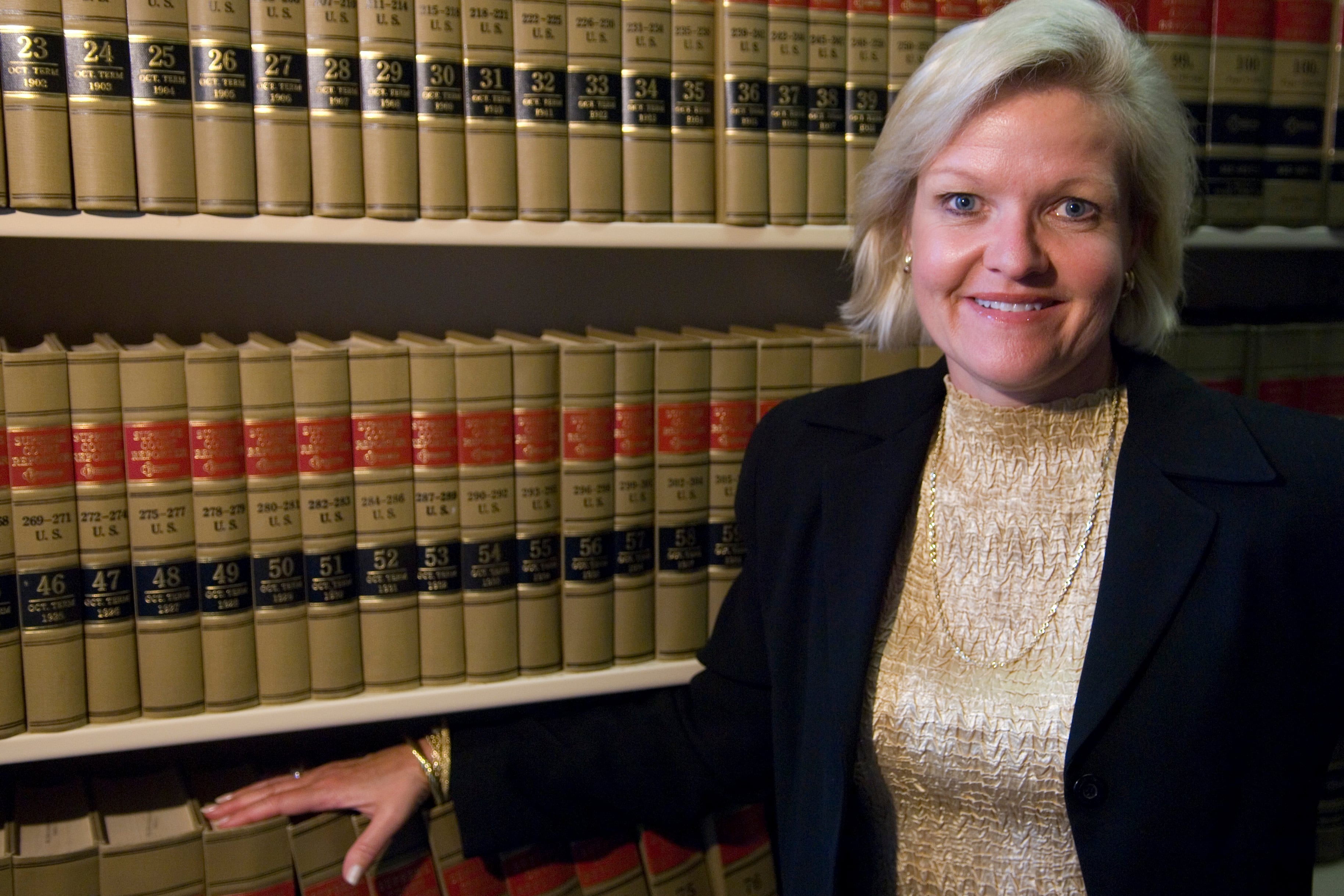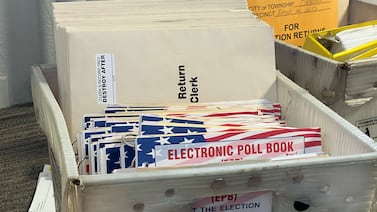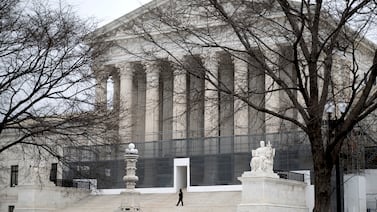Cleta Mitchell, a voter fraud conspiracy theorist who joined President Trump in the January phone call pressuring Georgia officials to “find” 11,000 more votes for him, now sits on the advisory board for the Election Assistance Commission, the only federal agency with authority over elections. Her nomination was done largely in secret — the bipartisan body that selected Mitchell discussed her qualifications and arrived at their decision entirely by email, preventing public scrutiny.
Mitchell was appointed to the EAC’s Board of Advisors by the U.S. Commission on Civil Rights, which gets to name two of the board’s 35 members. Her name was brought up for consideration by Civil Rights commissioner J. Christian Adams. Adams, whom Trump appointed to the commission last year, is a longtime business partner of Mitchell’s. Adams is the president of the conservative Public Interest Legal Foundation, and Mitchell is the group’s board chair. The pair have fundraised for conservative voter fraud groups extensively and have tried cases on election issues together.
Mitchell was among the most influential activists to support Trump’s false claim that he’d won the 2020 election. In addition to her direct relationship with Trump, conservative activist group FreedomWorks put Mitchell in charge of a $10 million fund aimed at supporting restrictive voting policies this year. She is also a senior legal fellow at the Conservative Partnership Institute, where she coordinates conservative responses to voting policies, such as opposition to H.R. 1. Mitchell also assisted in fundraising for the partisan “audit” of Arizona’s 2020 election results.
Mitchell’s appointment only became public on Nov. 12, when a person who received a brief membership update from the EAC forwarded the information to Votebeat. The update simply notes that it contains a revised list of advisory board members, and the “11-15-21 Revision reflects the appointment of Cleta Mitchell, Senior Legal Fellow, Conservative Partnership Institute, effective 11-03-21.”
Maria Cantú, the chair of the U.S. Commission on Civil Rights who was appointed this year by the Biden White House, said that the choice to discuss Mitchell’s nomination over email was done “in the interest of time” so that the commission did not have to wait “a month or more” until the next public meeting to make a determination. She denied that it was to prevent oversight of the decision, though it has had that effect. While the commissioners voted in a late-August public meeting to finalize Mitchell’s appointment, the USCCR didn’t tell the Election Assistance Commission of its choice until more than a month later on Nov. 3, the day her term began. A USCCR spokesperson said the commission waited so long because the commission’s second appointee, longtime Democratic commissioner Michael Yaki, withdrew his name, and commissioners wanted to send both appointments to the EAC at the same time.
Mitchell’s selection resulted from an unorthodox process by the Civil Rights commission, according to two people with direct knowledge of the process. In April, the commission changed the nominating procedures for members of the EAC advisory board, following Republican commissioners’ complaints that the two USCCR appointees were both Democrats — there previously was no requirement the nominations be bipartisan, and the USCCR’s appointees have often been Democrats. According to the transcript of the April meeting, commissioners determined that going forward the commissioners from each party would submit two candidates, and each would be allowed to veto one of the opposing party’s choices. Two Democrats, Nevada lawyer David Kladney and New York lawyer Debo P. Adegbile, voted against that change.
The two Republican nominations turned out to be Mitchell and Adams himself.
“The Progressive caucus ranked Ms. Mitchell slightly more suitable for a bipartisanship appointment,” Cantú wrote in a statement, saying it was her obligation as chair to advance the nomination. “Personally, I am not pleased with the appointment and would have welcomed another choice. ”
Cantú laid the blame for this appointment process, and the resulting uproar, at Adams’ feet. Mitchell was “more of an unknown variable” than Adams. Commission staff say Adams’ brash behavior and rank partisanship have gridlocked the committee for months, and the other conservatives on the commission have followed his lead.
Cantú said the conservatives previously had “blocked ratifying my appointment,” leaving the commission without a chair for three months. Cantú was approved in April, immediately after the commissioners approved the changes to the EAC appointment process. The commissioners felt their hands were tied when they approved Mitchell, Cantú said, because the conservatives made clear that relenting to one of the Republicans’ advisory board candidates was the only way to make progress on other business.
It’s unclear when the email discussion of Mitchell’s candidacy took place, or what specific objections, if any, commissioners raised. A commission spokesperson said details of that process had not been shared with her, and the USCCR has not yet responded to a Freedom of Information Act request for documents about their decision-making. In the August meeting, the eight commissioners took a final vote on the pair of appointments, with no discussions of Mitchell’s record or qualifications. She was mentioned by name only twice in the conversation before the roll call. One Democrat, Kladney, voted against the appointments. Yaki abstained, and Adegbile, joining Cantú, voted in favor. None responded to requests for an interview.
After Votebeat broke the news of Mitchell’s appointment Monday, the EAC and the USCCR appeared to scramble to respond, even though the vote had been held months before. The EAC put out a statement late Monday, distancing itself from the decision and explaining that it had no control over the appointments, without referring to Mitchell by name. The USCCR followed with a statement, saying that Mitchell had been selected from two possibilities presented by the commission’s Republican members.
Election administrators and across the country protested in public and reacted more angrily in private, and many were appalled that a person who’d baselessly denigrated their work would be given such a role. Many administrators called EAC commissioners and staff to demand an explanation. For their part, the EAC commissioners have chosen to stay silent about Mitchell’s appointment.
A statement to Votebeat signed by all four EAC commissioners — Democrats Tom Hicks and Ben Hovland, and Republicans Christy McCormick and Don Palmer — said it was inappropriate for them to speak out against any appointee. “It is not the role of EAC Commissioners to comment on or criticize appointments made by outside institutions to our Board of Advisors, regardless of any personal or professional beliefs,” they wrote. “We trust appointing organizations, in this case the US Commission on Civil Rights, as established by law, to dutifully carry out their responsibilities in selecting qualified candidates to the EAC Board of Advisors.”
The Help America Vote Act, which designated the USCCR to appoint two candidates to the Board of Advisors, sets no standards for qualifications of its members nor any opportunity for the EAC to review the selections. Several federal commissions and departments as well as nongovernmental organizations — ranging from the Department of Homeland Security to the Brennan Center for Justice — place members on the board. The Board of Advisors gives feedback on the agency’s core functions — such as the establishment of voting machine standards and providing best practices guidance to states — but does not have binding authority.
Adams and Mitchell appeared to be enjoying their victory this week and played up the fact that Mitchell’s appointment was made possible because of Democratic commissioners’ votes. Adams spent much of Monday and Tuesday clouding his role in the process, noting on Twitter, “The Democrat members of the commission ultimately chose Cleta Mitchell. They could have chosen someone else, but did not,” omitting that the alternative was himself. He later tweeted at a journalist, in another veiled reference to himself, “The other choice was a chump.”
Mitchell tweeted on Wednesday: “Many thanks to the bipartisan support I received to serve on Advisory Board of Election Assistance Commission. The EAC was established after the 2000 presidential election amid Democrats’ claims that Pres George W Bush was not legitimately elected. Just saying’.”
Adams invited Mitchell on a conservative talk radio program he guest hosted Wednesday morning, noting, “the left has gone apoplectic in the last 24 hours because they learned that the Democrats picked you.” Mitchell chimed in, saying the commission had “picked me, instead of, I guess—they had a choice between you and me. And they picked me. So, I don’t know what that says. But I’m very grateful for the bipartisan show of support here.”
At Friday’s USCCR meeting, the commissioners tried to cope with the aftermath of their decision, including approving a Democratic replacement for Yaki on the advisory board. But first came a lengthy discussion on Mitchell’s appointment, during which nearly all the commissioners avoided using her name.
Adegbile, one of the commission Democrats, asked the staff to investigate potential conflicts of interest between Mitchell and Adams. He said Adams had not disclosed any financial relationship, and that information “should have been the subject of inquiry with the appropriate official at the commission.” The commission’s staff director agreed to research whether Adams and Mitchell’s association would violate ethics requirements and report back. Cantú said “no commissioner” disclosed any conflicts of interest, even though they were asked to. (A spokesperson for the USCCR later told me she was unaware of whether any of the commissioners’ assistants researched Mitchell’s background during the two months commissioners considered her.)
Adams did not specifically address these concerns, but said media reports had led to “a tremendous fever to see the EAC pick ridded of Mitchell.” He offered to “go right back to square one,” and offer a new slate of Republican candidates if the commission requested they do so. He noted that no commissioner raised objections to Mitchell in the August meeting when she was approved.
Given that Mitchell was already seated on the advisory board and the discussion began as part of the approval process for an entirely different candidate, the call descended into frustration. “I’m a bit confused at this point,” said Commissioner Gail Heriot, an independent and a law professor in California. “When we start repeating ourselves,” Cantú said, “then it’ll be at a point where I can call a question.” Heriot, laughing, said, “I think we are repeating ourselves.”
Cantu called the conversation a “good team building exercise,” and called a vote on Yaki’s advisory board replacement. That candidate, Jenny Carroll, the chair of the Alabama State Advisory Committee to the USCCR, was unanimously approved.
Now that the Civil Rights commission has formally appointed Mitchell, only the Civil Rights commission can remove her. Those with knowledge of the commission say that’s unlikely to happen. The commission is split 4–4 along ideological lines, and has routinely deadlocked on even basic decisions since Adams joined. Staffers at the Senate Judiciary Committee and House Administration Committees, which oversee the USCCR and EAC respectively, said that they’d been researching ways to reverse the decision or remove Adams. According to the statutes governing the USCCR, commissioners may be removed “only for neglect of duty or malfeasance in office.” Adams’ term ends in December 2025.






